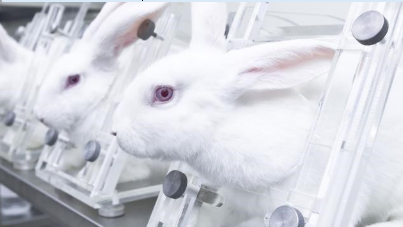Animal Testing
- Yara Hassan
- Mar 18, 2025
- 2 min read
Animal Testing – Ethical or Not?
In medicine, animal testing has been gaining recognition, with constant debate regarding the weighing of benefits with possible ethical concerns in terms of animal welfare. This article will explore both sides of these arguments, using scientific justifications, ethical dilemmas, and alternatives.
Is it Scientifically Necessary?
People who support the idea of animal testing argue that it has played a huge role in numerous medical advancements. Animals have very similar biological and physiological similarities to humans, making them valuable models for studying various fronts, such as diseases and potential treatments, medicines, beauty products, etc. For example, animal-involved research has contributed to the development of life-saving interventions such as vaccines, antibiotics, and surgical techniques. The National Institutes of Health (NIH) stress on the idea that animal studies are often essential before widening the innovations to humans. This is said to ensure the safety and efficiency of these new interventions.
Ethical Factors

Contrarily, critics highlight the moral issues that can be linked with subjecting animals to experimentation Animals used in research oftentimes undergo extreme pain, suffering, and discomforting processes, which is a major source of concern from many different perspectives. Furthermore, because animal study results don't always translate well to human outcomes, the validity of animal testing is called into question. According to Akhtar, roughly 96% of drugs that are considered safe in animal testing end up failing in human clinical trials because of unanticipated side effects or ineffectiveness.
(“Arguments against Animal Testing | Cruelty Free International”)
The 3Rs Principle
In response to these ethical concerns, the scientific community has developed the 3Rs principle: Replacement, Reduction, and Refinement.
Replacement: Making use of other methods that avoid using animals and/or living organisms in studies.
Reduction: Using techniques that minimizes the number of animals involved, with the same goal of acquiring information at the same rates; just with a reduced amount of subjects.
Refinement: Changing experimental protocols to improve animal wellbeing by reducing or eliminating pain and suffering.
Institutions like Harvard Medical School favor these principles, highlighting the importance of considering alternative methods and ensuring humane treatment when animal use is required.
Advancements in Alternatives
Many alternatives to animal testing have been developed as a result of technological advancements, including:
In Vitro Testing: Using tissue and cell cultures to investigate biological processes and evaluate possible therapies.
Organ-on-a-Chip Systems: These are micro engineered gadgets that mimic the operations of human organs, giving drug testing more precise models.
Computer modeling: sophisticated models that forecast the effects of medications on the human body.
These approaches provide potential gains in effectiveness and relevance to human physiology in addition to addressing ethical concerns.
Conclusion
The debate over animal testing in medicine encompasses both significant scientific contributions and intense ethical questions. While animal research has played a vital role in medical progress, the growing development of alternative methods demonstrates a societal shift towards more humane research practices. Balancing scientific advancement with ethics remains a constantly evolving challenge in the field of medical research.
Bibliography
Akhtar, Aysha. “The Flaws and Human Harms of Animal Experimentation.” Cambridge Quarterly of Healthcare Ethics, vol. 24, no. 04, 24 Oct. 2015, pp. 407–419, www.ncbi.nlm.nih.gov/pmc/articles/PMC4594046/, https://doi.org/10.1017/S0963180115000079.
“Arguments against Animal Testing | Cruelty Free International.” Crueltyfreeinternational.org, 2016, crueltyfreeinternational.org/about-animal-testing/arguments-against-animal-testing?utm_source=chatgpt.com.
NC3Rs. “The 3Rs.” Nc3rs.org.uk, nc3rs.org.uk/who-we-are/3rs.
“Why Animal Research Is Necessary.” Harvard.edu, 2022, hms.harvard.edu/research/animal-research/why-animal-research-necessary?utm_source=chatgpt.com.





Comments